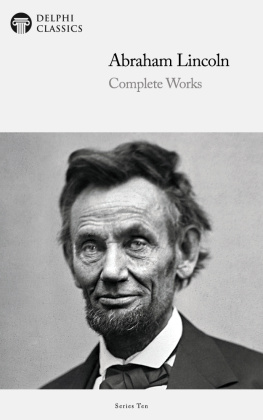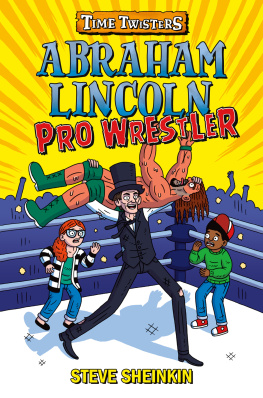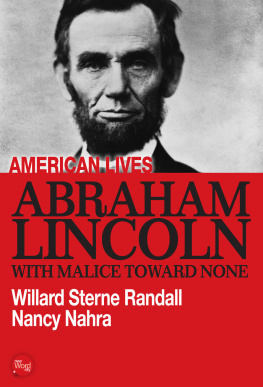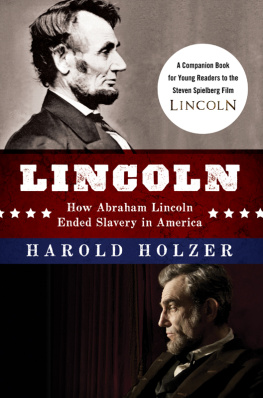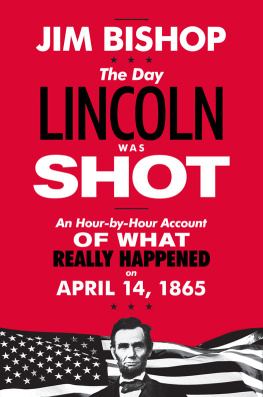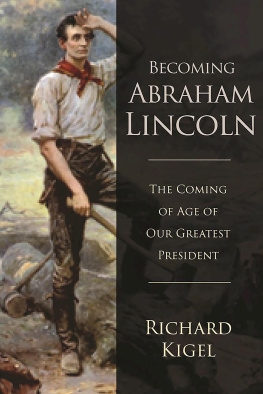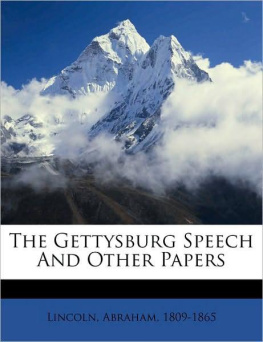Praise for Founders Son
Abraham Lincoln is the most written-about man in American history, yet Richard Brookhiser, a historian and writer of extraordinary talent, has written an analysis that is lively, incisive, noveland brilliant. This book reminds us of Lincolns reverence for the Founders, his stubborn concern for first principles andultimatelythe often-overlooked reverence for the Almighty God that guided him in Americas darkest hours.
JOHN BOEHNER, Speaker of the House
Lincoln was not a conventional politician, and neither is Richard Brookhiser a conventional historian, nor, fittingly, is Founders Son a conventional biography. For the sixteenth president, as Brookhiser dazzlingly argues, ideas matteredbut never so much as when translated into action. Throughout Lincolns life, the Founders served as his touchstones, their ideals his lodestars, and he dedicated himself to completing the task they had left unfinished; the destruction of slavery, that Damoclean Sword menacing the Republic since its creation, would be both his monument and his tomb. Founders Son is an ingenious intellectual biography, a work of the highest order written by one of our most creative historians about the most brilliant of our presidents.
ALEXANDER ROSE, author of Washingtons Spies: The Story of Americas First Spy Ring
It seems impossible, but its true: no one has ever looked at Lincoln in quite this way beforeand certainly not with Richard Brookhisers graceful touch, sly wit, and deep historical knowledge. The Founders foremost biographer has turned his eye to their greatest pupil, and everyone who cares about Lincoln (which should be everyone) will be grateful for it.
ANDREW FERGUSON, author of Land of Lincoln: Adventures in Abes America
FOUNDERS SON


Copyright 2014 by Richard Brookhiser
Published by Basic Books
A Member of the Perseus Books Group
All rights reserved. No part of this book may be reproduced in any manner whatsoever without written permission except in the case of brief quotations embodied in critical articles and reviews. For information, address Basic Books, 250 West 57th Street, New York, NY 10107.
Books published by Basic Books are available at special discounts for bulk purchases in the United States by corporations, institutions, and other organizations. For more information, please contact the Special Markets Department at the Perseus Books Group, 2300 Chestnut Street, Suite 200, Philadelphia, PA 19103, or call (800) 810-4145, ext. 5000, or e-mail .
Designed by Linda Mark
Text set in 11.5 pt Fairfield LT by the Perseus Books Group
Library of Congress Cataloging-in-Publication Data
Brookhiser, Richard.
Founders son : a life of Abraham Lincoln / Richard Brookhiser.
pages cm
Includes bibliographical references and index.
ISBN 978-0-465-05686-6 (e-book)
1. Lincoln, Abraham, 18091865. 2. PresidentsUnited StatesBiography.
3. United StatesPolitics and government18611865. I. Title.
E457.45.B76 2014
973.7092dc23
[B]
2014021173
10 9 8 7 6 5 4 3 2 1
For
Elizabeth Altham and her students
CONTENTS
N ineteenth-century rules for spelling and punctuation differed somewhat from ours, and the uneducated followed no rules at all; even Lincoln made a few characteristic mistakes throughout his life (he liked double consonantsverry). I have corrected and modernized everything I have quoted, except for italics used for emphasis (mostly by Lincoln, and by Parson Weems).
W HEN ABRAHAM LINCOLN WAS A YOUNG MAN IN HIS twenties, the last of the founding fathersthe men who won the Revolution and made the Constitutionfinally died. As their number dwindled, attentive people hastened to record their thoughts about America, its prospects and its problems, before they passed.
In November 1831, the last surviving signer of the Declaration of Independence, Charles Carroll, age ninety-four, was visited by Alexis de Tocqueville, a young Frenchman touring America to study its institutions. Carroll, a wealthy planter from the state of Maryland, reminded his guest of an English aristocratgenial, gracious, proud (he holds himself very erect, Tocqueville noted). Carroll was especially proud of the glory days of American independence and of his own role in proclaiming it. In the concluding sentence of the Declaration, the signers had pledged their lives, fortunes, and sacred honor to support it; Carroll let Tocqueville know that the fortune he had pledged had been the most considerable in America. (There go a few millions, another signer commented, with gallows humor, as Carroll signed the revolutionary document.)
The Revolution had been won, and Carroll kept his millions. Now, however, he fretted about the nation he had made, for America was becoming too democratic for his tastes. He mourned the old aristocratic institutions of Maryland, by which he meant property qualifications for voting, which had been abolished in 1810. (Before then, a Marylander had to own fifty acres of land to voteno problem for Carroll, who owned 13,000.) He feared even more changes. A mere Democracy, he warned Tocqueville as the visit ended, is but a mobwillful, possibly violent. Fortunately, America had a safety valve: Every year we can push our innovators out West. This was Carrolls vision of the frontier: as a dumping ground for democrats. Carroll died in 1832.
In February 1835, the last surviving signer of the Constitution, James Madison, played host to another curious traveler, Harriet Martineau, an English writer making her own study of the United States. Madison, an eighty-three-year-old Virginian, was a grander figure than Carroll, for he was a former president as well as the signer of a founding document. Physically he had aged harder than Carrollrheumatism confined him to a favorite chair in his bedroombut his mind and his conversation sparkled: Martineau, clearly enchanted with him, called him wonderful, lively, playful. Madisons upbeat temperament suited his politics, for unlike Carroll, he had no fear of democracy. He was a democratic politician par excellence; he and his best friend, Thomas Jefferson, had founded a political party (first called the Republican Party, then the Democratic) that had dominated American politics for over thirty years. Madison, as Martineau put it, reposed cheerfully, gaily... on his faith in the peoples power of wise self-government.
He had a concern of his own about the state of the nation, however, and that was slavery. Like Carroll, Madison was a planter and a slave owner. He had grown up with the institution, knew its evils from the inside, and discussed them frankly with Martineau. Slavery kept owners in a state of perpetual fear. It degraded slaves minds, even when it did not brutalize them physically (he cited promiscuity and cruelty to animals as bad habits encouraged by lives of bondage).
How could the country free itself of the evil? Ideally, Madison believed, slaves should be freed (though he had not freed his own). But where then could they go? Free states did not want themmany had stringent laws to keep out black immigrants; Canada, he thought, was too cold for them. Maybe they could be sent back to Africa (Martineau thought that scheme was fantastic: American slaves were Americans; they would not want to leave). Where slavery was concerned, the last of the founders owned himself to be almost in despair. In 1836 Madison died.
If the dying founders were anxious about their legacy, their heirs were no less troubled to see them go. Fathers should die before their children; it is the order of nature. But then responsibility and anxiety shift to new shoulders.
Next page

